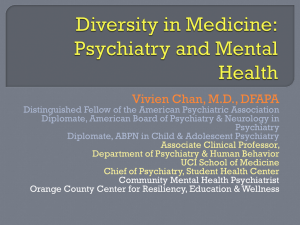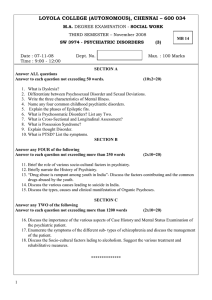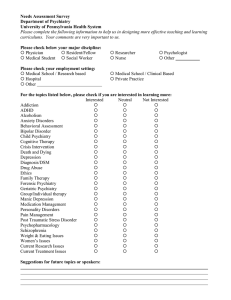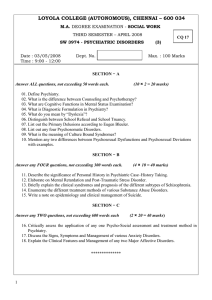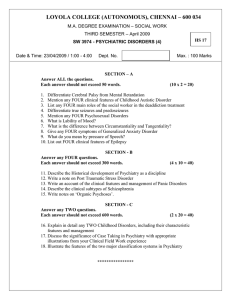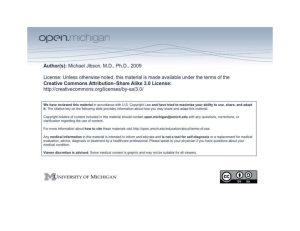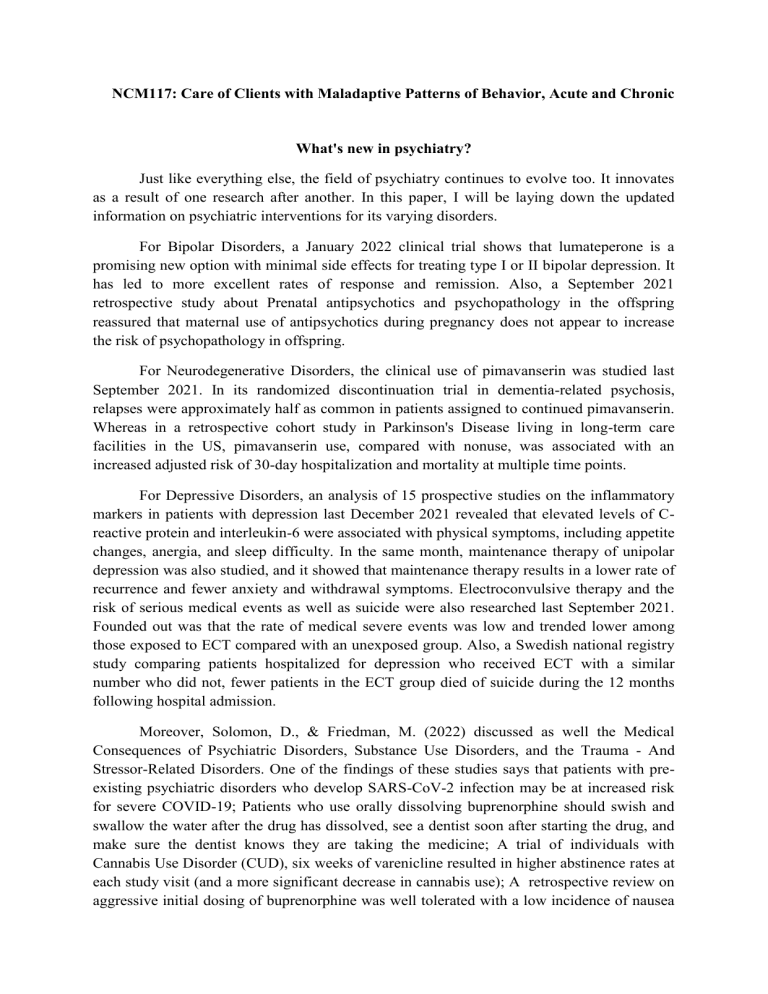
NCM117: Care of Clients with Maladaptive Patterns of Behavior, Acute and Chronic What's new in psychiatry? Just like everything else, the field of psychiatry continues to evolve too. It innovates as a result of one research after another. In this paper, I will be laying down the updated information on psychiatric interventions for its varying disorders. For Bipolar Disorders, a January 2022 clinical trial shows that lumateperone is a promising new option with minimal side effects for treating type I or II bipolar depression. It has led to more excellent rates of response and remission. Also, a September 2021 retrospective study about Prenatal antipsychotics and psychopathology in the offspring reassured that maternal use of antipsychotics during pregnancy does not appear to increase the risk of psychopathology in offspring. For Neurodegenerative Disorders, the clinical use of pimavanserin was studied last September 2021. In its randomized discontinuation trial in dementia-related psychosis, relapses were approximately half as common in patients assigned to continued pimavanserin. Whereas in a retrospective cohort study in Parkinson's Disease living in long-term care facilities in the US, pimavanserin use, compared with nonuse, was associated with an increased adjusted risk of 30-day hospitalization and mortality at multiple time points. For Depressive Disorders, an analysis of 15 prospective studies on the inflammatory markers in patients with depression last December 2021 revealed that elevated levels of Creactive protein and interleukin-6 were associated with physical symptoms, including appetite changes, anergia, and sleep difficulty. In the same month, maintenance therapy of unipolar depression was also studied, and it showed that maintenance therapy results in a lower rate of recurrence and fewer anxiety and withdrawal symptoms. Electroconvulsive therapy and the risk of serious medical events as well as suicide were also researched last September 2021. Founded out was that the rate of medical severe events was low and trended lower among those exposed to ECT compared with an unexposed group. Also, a Swedish national registry study comparing patients hospitalized for depression who received ECT with a similar number who did not, fewer patients in the ECT group died of suicide during the 12 months following hospital admission. Moreover, Solomon, D., & Friedman, M. (2022) discussed as well the Medical Consequences of Psychiatric Disorders, Substance Use Disorders, and the Trauma - And Stressor-Related Disorders. One of the findings of these studies says that patients with preexisting psychiatric disorders who develop SARS-CoV-2 infection may be at increased risk for severe COVID-19; Patients who use orally dissolving buprenorphine should swish and swallow the water after the drug has dissolved, see a dentist soon after starting the drug, and make sure the dentist knows they are taking the medicine; A trial of individuals with Cannabis Use Disorder (CUD), six weeks of varenicline resulted in higher abstinence rates at each study visit (and a more significant decrease in cannabis use); A retrospective review on aggressive initial dosing of buprenorphine was well tolerated with a low incidence of nausea or vomiting and without toxicity; and A clinical trial including of individuals with severe Post-Traumatic Stress Disorder, MDMA (ecstasy) combined with manualized psychotherapy led to both a more remarkable improvement in PTSD symptoms and a more significant decline in functional impairment than manualized psychotherapy. Other psychiatry issues were also tackled by Solomon, D., & Friedman, M. (2022), and it included Daridorexant for treatment of insomnia in adults as it was found to improve both subjective and objective measures of sleep onset and sleep maintenance. Last but not least, it talked about Suicide in nurses and physicians, which were found that from 2017 to 2018, nurses had a nonstatistically significant increased incidence of suicide compared with physicians. Whereby the elevated suicide risk in nurses was believed to be due to job demands, avoiding the use of psychiatric care due to stigma, or access to medications as a means of suicide. Today, these studies speak volumes of the latest updates and research in the various field of psychiatry. However, as experts and researchers continue to explore, validate, and improve the current situation, months or days after this writing, newer information will surely be out for our use. Nonetheless, I learned in this article that, as sciences like psychiatry tend to get updated day by day, student nurses, as to become competent future professionals, should be an ally to the healthcare system in providing the newest and most updated scientific and theoretically based nursing care to every single patient coming in for their well-being. Reference: Solomon, D., & Friedman, M. (2022, January 25). What’s new in psychiatry. UpToDate. Retrieved January 1, 2022, from https://www.uptodate.com/contents/whats-new-inpsychiatry

